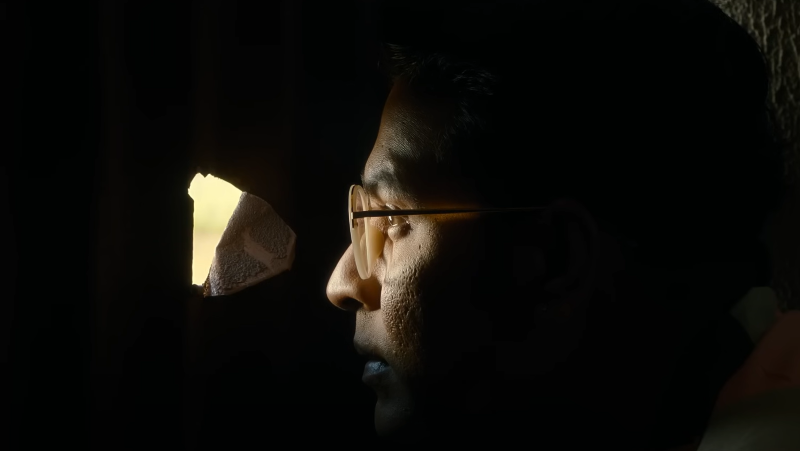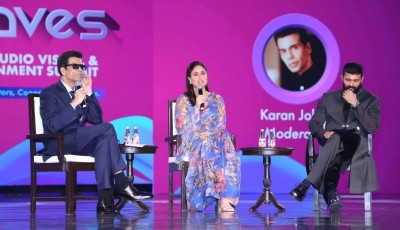Athhoi: Shakespearean stories have greater impact when told in a surrealistic space, says Anirban Bhattacharya
Besides featuring in one of the main roles, Anirban Bhattacharya donned the creative director's hat in Arna Mukhopadhyay's Athhoi, an adaptation of William Shakespeare's Othello. In an interaction with IBNS correspondent Souvik Ghosh, Anirban speaks on his 'Athhoi' journey, working chemistry with Arna Mukhopadhyay and more...
Q. Q. How could you and Arna Mukhopadhyay maintain the borderline as the creative director and director respectively?
A. The final call always remains with the director. As a creative director, I am not entitled to take a call. I have utilised my experience of directing Mandaar and Ballabhpurer Roopkotha in Athhoi. I can give my opinions to Arna-da but the final decision always rests with the director.
 Photo courtesy: Screenshot grab from trailer video
Photo courtesy: Screenshot grab from trailer video
Q. How do you see the new designations like creative director or creative producer or intimacy director in films?
A. Intimacy director is a role which has emerged following the #metoo movement. I feel it was the correct step. Even I felt the need of someone like an intimacy director or a coordinator or a choreographer while acting in an intimate scene. Even new actors feel uncomfortable shooting such scenes at the start of their careers.
As a creative director, unlike creative producers who roughly look at the peripheral structure of a film, I remained present on the shooting floor. In the Bengali film industry, we follow the basic format of being a creative director.
Image by Avishek Mitra/IBNS
Q. How do you interpret the Shakespearean world?
A. I look at the Shakespearean world as larger-than-life. His characters are a bit detached from reality. The storyline is told from a top view. The characters are always detached from reality, in an isolation to create a new world out of them. Even in Athhoi, the protagonist's home is in a desolate place, which is not a real space similar to the Shakespearean world. We have noticed such things even in Kurosawa's (Akira Kurosawa, Japanese filmmaking legend) films. I consider this departure from realism as an ingredient of the Shakespearean world. I have shown it in Mandaar. The impact is always stronger, I believe, if a Shakespearean story is told in a hyperrealistic or surrealistic space.
Q. Do you feel Shakespearean plays are more cinematic?
A. Cinema after its journey of 130-140 years no longer has any particular definition. Almost everything possible has been explored and experimented in cinema. Cinema has explored everything in stagnancy and mobility. Anything captured in a camera can or cannot be considered as a cinema, depending upon one's perspective. So I can't really explain whether Shakespearean plays are cinematic or not. Shakespearean plays can be as cinematic as the novel of Bibhutibhushan Bandyopadhyay (Bengali writer). The cinematic or not depends on how a story is filmed. Personally I feel each and every story is cinematic.
 Photo courtesy: Screenshot grab from trailer video
Photo courtesy: Screenshot grab from trailer video
Q. How does your approach to a role change from a regular role to the one adapted from text?
A. The principle remains the same. In the case of Athhoi, the role was already sketched because I have been working on the play for seven years. But in any film, I won't improvise something that would dilute my character. I would do anything that a character demands.
Q. You are known for perfection in telling a story. How challenging is it to achieve perfection and work meticulously within the constraints of the Bengali film industry?
A. Honestly, it is challenging because time is science. We can chase time up to a certain limit after which one has to accept the reality as it is. Prior to giving up the chase, one has to double or triple their labour both mentally and physically. The Bengali cinema has become a very laborious, physical task, which can only pull off the work. The source of pulling off double the work at a given time lies in the script. The script has to be made in a way with all aspirations, imaginations and dreams that can be achieved. It ismeaningless to aspire for something that can't be achieved in our infrastructure. Having said that, we are also provided with high-end equipment that can't be dismissed as unworthy. The constraint is we are provided for a small period of time.
 Photo courtesy: Screenshot grab from trailer video
Photo courtesy: Screenshot grab from trailer video
Q. You have an ideology of aspiring for something not more than what is required in life. How much does this influence your art?
A. No, the ideology of my life is a completely different arena. I don't measure my art on a scale of requirement. If I do it, the core of an art will be dissolved. Life is different. The requirements in life depend on my status, location etc. Even now I am realising the need for certain things in life after having a family. I have started considering certain things as requirements which I had once felt not needed in life. Having said that, I don't waste money on something that is absolutely not needed.
(Images by Avishek Mitra/IBNS)
Support Our Journalism
We cannot do without you.. your contribution supports unbiased journalism
IBNS is not driven by any ism- not wokeism, not racism, not skewed secularism, not hyper right-wing or left liberal ideals, nor by any hardline religious beliefs or hyper nationalism. We want to serve you good old objective news, as they are. We do not judge or preach. We let people decide for themselves. We only try to present factual and well-sourced news.







